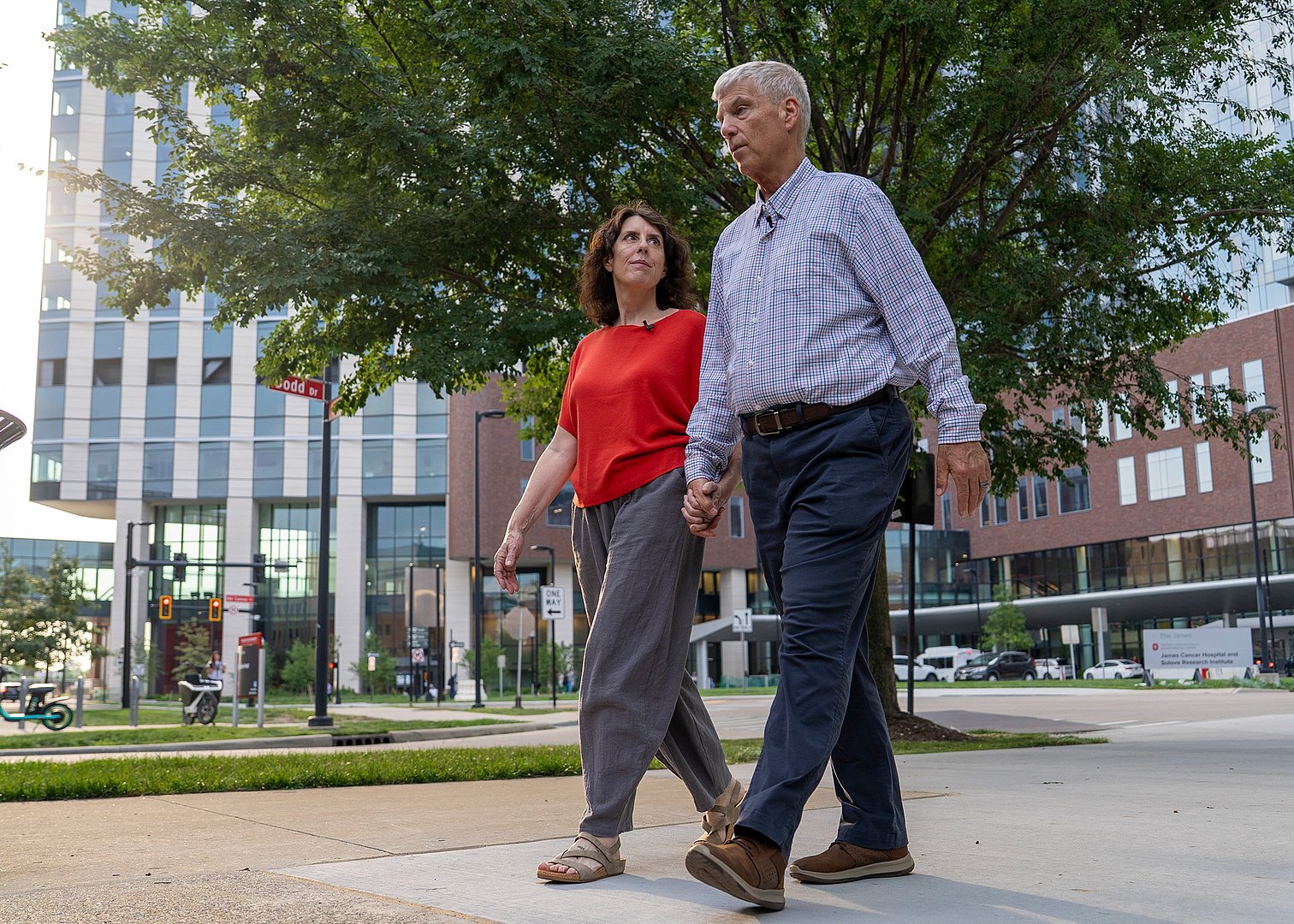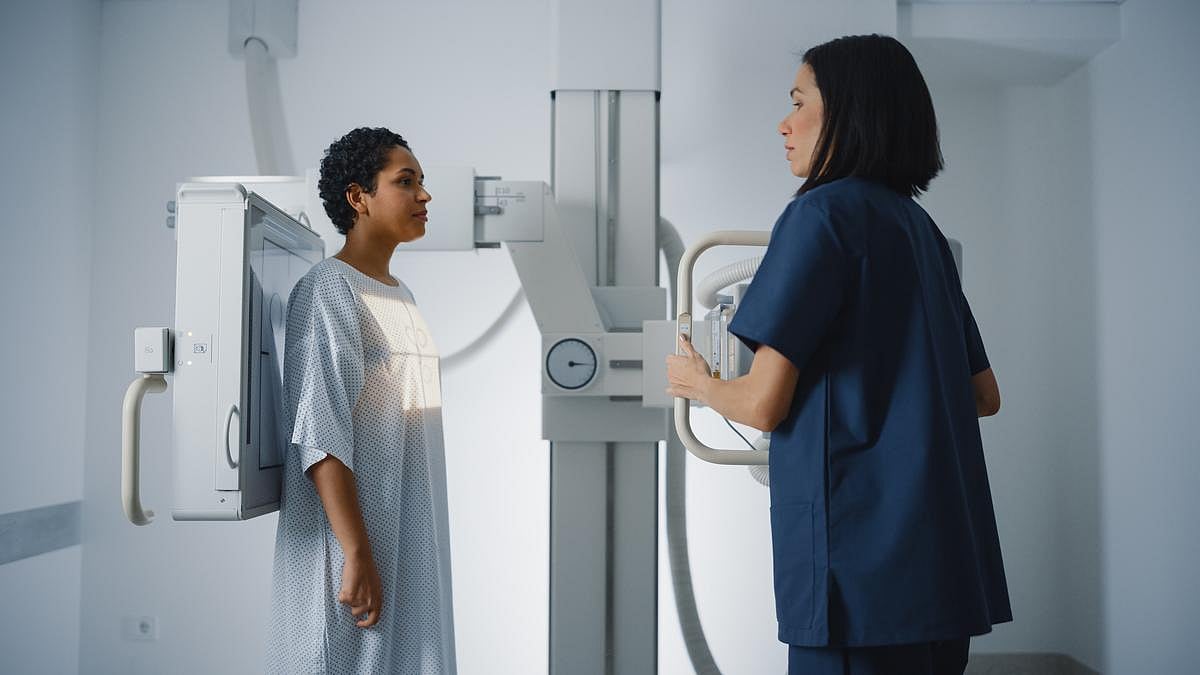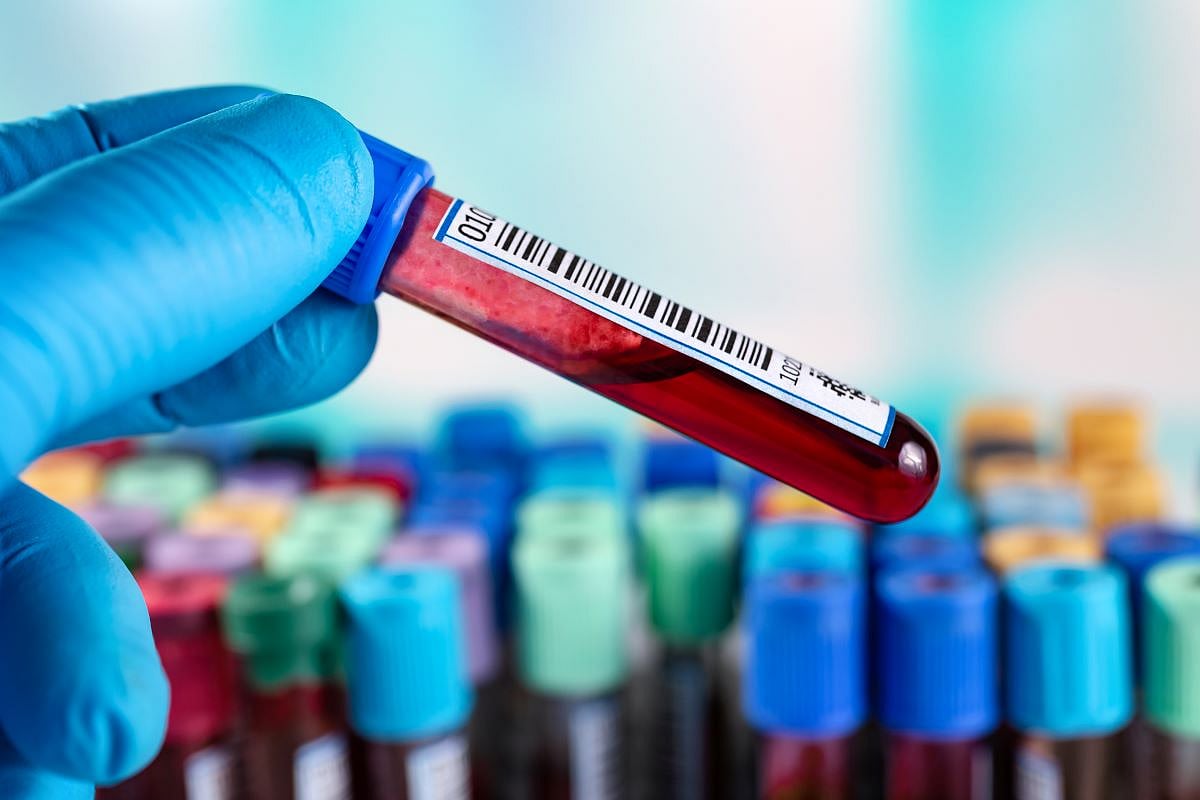Manténgase sano!
Resultados de su búsqueda "Cancer: Prostate".
05 Sep
Prostate Cancer Rates on the Rise After Years of Decline
Prostate cancer rates are increasing about 3% per year, according to a new report from the American Cancer Society. And the biggest increases are being seen in advanced-stage disease, which is harder to treat.
27 May
More Evidence Exercise Boosts Cancer Survival
A new study finds people who are physically active after a cancer diagnosis lower their risk of death significantly.
13 Mar
Red Wine Isn’t Any Healthier Than White Wine—With Two Possible Exceptions
A new study finds no significant difference in overall cancer risk between red and white wine. However, researchers say white wine was associated with an increased risk of skin cancer.
Resultados de noticias de salud - 105
A pill used to treat an overactive bladder can also be used to reduce hot flashes among men taking hormone-deprivation therapy for prostate cancer.
Men taking oxybutynin had a dramatic decrease in the number and intensity of hot ...
- Dennis Thompson HealthDay Reporter
- |
- February 4, 2026
- |
- Página completa
A powerful new drug combo has yielded a major breakthrough for men battling an aggressive form of prostate cancer.
Adding the drug enzalutamide to standard hormone therapy reduced the risk of premature death by more than 40% i...
- Deanna Neff HealthDay Reporter
- |
- October 22, 2025
- |
- Página completa
Former President Joe Biden is now receiving radiation and hormone therapy to treat an aggressive form of prostate cancer, his office confirmed Saturday.
“As part of a treatment plan for prostate cancer, President Biden is currently undergoing radiation therapy and hormone treatment,”
- I. Edwards HealthDay Reporter
- |
- October 14, 2025
- |
- Página completa
A new drug combo is offering hope for men with advanced prostate cancer.
Adding the targeted cancer drug niraparib to hormone therapy reduced the risk of prostate tumor growth and slowed symptom advance, according to findings ...
- Dennis Thompson HealthDay Reporter
- |
- October 10, 2025
- |
- Página completa
Prostate cancer rates are climbing in the U.S. with more men being diagnosed at later stages when the disease is harder to treat, researchers report.
The analysis — published Tuesday in the journal CA: A Cancer...
- I. Edwards HealthDay Reporter
- |
- September 4, 2025
- |
- Página completa
Too often, American men and their loved ones mistakenly believe that prostate cancers must always present with symptoms, a new poll shows.
Of the people polled, 4 out of 5 people (80%) did not know that the early-stage prostate cancer often arises in the absence of symptoms and is typ...
- Ernie Mundell HealthDay Reporter
- |
- September 2, 2025
- |
- Página completa
Men diagnosed with what are known as Grade Group one (GG1) prostate tumors are often told they don’t require treatment, only “watchful waiting,” because GG1 cancers are at low risk of spreading.
There’s even been talk among experts of not calling GG1 tumors “cancers&rdquo...
- HealthDay Reporter
- |
- August 1, 2025
- |
- Página completa
Firefighters work hard saving lives, and in process put their own lives at heightened risk from skin, kidney and other types of cancers, a new American Cancer Society (ACS) study finds.
“Although this isn’t favorable news, this study shines a spotlight on the long-term risks firefighters face beyond the immediate dangers of fighting a fire,” said lead author
Longtime ESPN “SportsCenter” anchor Jay Harris has been diagnosed with prostate cancer and is scheduled to have surgery on June 10.
Harris, 60, wrote about his experience in an essay posted June 5 on ESPN’s Front Row w...
- HealthDay Reporter
- I. Edwards
- |
- June 6, 2025
- |
- Página completa
Former President Joe Biden's prostate cancer diagnosis has drawn attention to screening guidelines for older men.
When Biden, 82, was diagnosed last week, his cancer had already spread to his bones. His last prostate screening was more than a decade ago.
“President Biden’s last...
- HealthDay Reporter
- I. Edwards
- |
- May 23, 2025
- |
- Página completa
Former President Joe Biden has been diagnosed with advanced prostate cancer that has spread to his bones, his office announced Sunday.
Doctors found the cancer after Biden reported urinary symptoms. Testing showed a small nodule on his prostate. ...
- HealthDay Reporter
- I. Edwards
- |
- May 19, 2025
- |
- Página completa
Men in “watchful waiting” mode for their low-risk prostate cancer are staying healthier longer thanks to advanced imaging and treatments designed to keep their tumor at bay, a new study says.
Advanced MRI imaging and MRI-guided biopsies are providing a much clearer vie...
- HealthDay Reporter
- Dennis Thompson
- |
- May 15, 2025
- |
- Página completa
Some men would rather skip screening for prostate cancer due to fears that they’ll be rendered impotent or incontinent from cancer surgery.
But new research says those fears are unwarranted, thanks to improvements in the way doctors approach prostate cancer.
The number of unnecessa...
- HealthDay Reporter
- Dennis Thompson
- |
- May 8, 2025
- |
- Página completa
Radiation therapy is commonly used to treat prostate cancer, but it can cause embarrassing urinary problems in some men.
But a new genetic test appears capable of sussing out which men are at greater risk of urinary side effects from radiation treatment, a new study says.
Th...
- HealthDay Reporter
- Dennis Thompson
- |
- April 16, 2025
- |
- Página completa
A pioneering technique can help nearly twice as many men preserve erectile function following prostate cancer surgery, researchers say.
The new surgical method, called NeuroSAFE, preserves the nerves that run through the prostate’s outer layers, which are thought to be responsible for pr...
- HealthDay Reporter
- Dennis Thompson
- |
- March 28, 2025
- |
- Página completa
TUESDAY, Feb. 18, 2025 (HealthDay News) -- A mobile "Man Van" screening program detected dozens of prostate cancer cases in disadvantaged neighborhoods of London, researchers report.
A team led by Dr. Masood Moghul of Royal Marsden Hospital in London reported
Cancer screenings can save lives by detecting cancer early, when treatment is most effective.
With an estimated 2 million new cancer cases expected in 2025, regular screenings are more important than ever, according to the American Cancer Society.
February is National Cancer Prevention Month, which make...
- HealthDay Reporter
- India Edwards
- |
- February 15, 2025
- |
- Página completa
It’s tough for a man to know what to do following a diagnosis of prostate cancer.
The treatment is often worse than the risk posed by the cancer itself, causing some men to suffer incontinence and impotence even though their tumor wouldn’t have killed them.
It&rs...
- HealthDay Reporter
- Dennis Thompson
- |
- February 4, 2025
- |
- Página completa
Men who opt for "watchful waiting" instead of treatment for a low-risk prostate cancer might improve their odds if they take fish oil supplements, early research suggests.
“Many men are interested in lifestyle changes, including diet, to help manage their cancer and prevent the progression of their disease," noted study author
“An ounce of prevention is worth a pound of cure,” founding father Benjamin Franklin once said.
That’s definitely true of cancer, a new study has found.
Cancer prevention and screening has saved more people from five types of cancer during the past 45 years than advances in tr...
- HealthDay Reporter
- Dennis Thompson
- |
- December 5, 2024
- |
- Página completa
Overtreatment of prostate cancer is increasing in the United States among men with limited life expectancy, a new study reports.
Procedures like radiation therapy and prostate surgery are being employed more often in these men, causing side effects like incontinence and impotence without adding any mo...
- HealthDay Reporter
- Dennis Thompson
- |
- November 13, 2024
- |
- Página completa
Men who undergo prostate cancer treatment face a greatly increased risk of life-altering, long-term complications, a new study finds.
Surgery for prostate cancers increases a man’s risk of urinary or sexual complications more than sevenfold, researchers reported Nov. 7 in the journal
- HealthDay Reporter
- Dennis Thompson
- |
- November 8, 2024
- |
- Página completa
Exposure to any one of 22 pesticides may bring heightened odds of developing prostate cancer, a new analysis suggests.
The study was conducted over decades because prostate cancer is known to grow very slowly, noted a team led by Dr. Simon John Christoph Soerensen, of Stanford University in California.
The researchers looke...
- HealthDay Reporter
- Ernie Mundell
- |
- November 5, 2024
- |
- Página completa
A lack of health insurance coverage raises the risk that cancers among Black and Hispanic Americans will be caught too late, a new study suggests.
Being uninsured accounts for a significant proportion of racial and ethnic disparities in cancers that are only detected at a l...
- HealthDay Reporter
- Dennis Thompson
- |
- October 30, 2024
- |
- Página completa
Artificial intelligence might be able to help doctors detect the prostate cancers most likely to be life-threatening to men, a new study suggests.
An AI program successfully identified and outlined 85% of the most aggressive prostate tumors seen on MRI scans of more than 700 patie...
- HealthDay Reporter
- Dennis Thompson
- |
- October 29, 2024
- |
- Página completa
A healthy diet can help keep prostate cancer in check, a new study finds.
The better a man eats, the less likely his low-grade prostate cancer will progress to a more dangerous state, researchers reported Oct. 17 in the journal
Having close family and friends who care about their health makes women more likely to get regularly screened for cancer, a new study has found.
Women are more likely to undergo regular cancer screening if they have a tighter web of social and emotional connections, researchers reported Oct. 17 in the journal Cancer Causes & Contro...
- HealthDay Reporter
- Dennis Thompson
- |
- October 18, 2024
- |
- Página completa
A simple blood test may help doctors decide the best way to treat a man with advanced prostate cancer.
A phase 3 clinical trial has shown that circulating tumor cell (CTC) counts can predict which men are likely to respond to standard treatment and live longest and which might benefit from more aggressive new drug trials.
CTCs are rare cancer cells that tumors shed in the blood. The...
- HealthDay Reporter
- Carole Tanzer Miller
- |
- October 7, 2024
- |
- Página completa
A new survey finds the majority of American men believe the first step in prostate cancer screening is an invasive rectal exam by their doctor.
That's not true, but mistaken beliefs like these could keep men from getting screened until prostate cancer is discovered far too late, the American Cancer S...
- HealthDay Reporter
- Ernie Mundell
- |
- September 9, 2024
- |
- Página completa
Men, take note: Cancer cases and deaths among males will jump globally by 84% and 93%, respectively, by 2050, new research predicts.
Published Monday in the journal Cancer, the study found the increases were greater among men 65 and older and in countries and territories with a low or medium "human d...
- HealthDay Reporter
- Robin Foster
- |
- August 13, 2024
- |
- Página completa
For years, the treatment of early-stage prostate cancers that haven't spread beyond the organ have often included the removal of nearby lymph nodes in the pelvis. It's done as a precaution and as a means of "staging" the disease.
Now, a major expert review on the topic suggests that, in many cases, men in this situation may be better off keeping their lymph nodes.
Doing so may help...
- HealthDay Reporter
- Ernie Mundell
- |
- August 12, 2024
- |
- Página completa
Cancer rates are rising among Gen Xers and millennials, a new study reports.
Successively younger generations are more frequently being diagnosed half of the 34 known cancer types, researchers found.
For example, people born in 1990 have two to three times higher...
- HealthDay Reporter
- Dennis Thompson
- |
- August 1, 2024
- |
- Página completa
The stress of living in a poor neighborhood might contribute to higher rates of aggressive prostate cancer in Black men, a new study warns.
Black men are more than twice as likely to die from prostate cancer than white men, and more likely to develop it as well, the researchers no...
- HealthDay Reporter
- Dennis Thompson
- |
- July 16, 2024
- |
- Página completa
American men are blowing their best chance to head off cancer or spot it early, when it's easiest to treat, a new survey warns.
More than 6 in 10 (65%) men in the nationwide survey said they are behind on at least one routine cancer screening, while nearly 1 in 5 admitted they don't even schedule their own health care appointments.
Those are the key findings from the annual
- HealthDay Reporter
- Carole Tanzer Miller
- |
- July 5, 2024
- |
- Página completa
Current screening standards could miss early-stage prostate cancer in transgender women, a new study warns.
Prostate cancer tests look for prostate-specific antigen (PSA), a protein produced by the small gland. Blood levels of PSA tend to be elevated in people with prostate cancer.
But the estrogen that many transgender women take as part of their gender-affirming care "drastically ...
- HealthDay Reporter
- Dennis Thompson
- |
- July 1, 2024
- |
- Página completa
Prostate medications might help reduce the risk of a specific type of dementia, a new study suggests.
People were less likely to develop Lewy body dementia when taking drugs designed to treat urinary symptoms caused by an enlarged prostate, researchers reported June 19 in the journal Neurology.
...- HealthDay Reporter
- Dennis Thompson
- |
- June 20, 2024
- |
- Página completa
British retiree David Butler was surprised to find that he had prostate cancer, and that it had spread to the lymph nodes and other places near the prostate.
"I had literally no symptoms apart from needing to pee more quickly whenever I did go to the toilet,"Butler, 77, said in a ...
- HealthDay Reporter
- Dennis Thompson
- |
- June 11, 2024
- |
- Página completa
For a large percentage of men with prostate cancer, the tumor may be so slow-growing that doctors advise a "watch-and-wait" approach instead of active treatment.
Now, a study of almost 2,200 patients followed for up to a decade finds that, for most, that decision may be a wise one.
"In this study, 10 years after diagnosis, 49% of men remained free of progression or treatment, less t...
- HealthDay Reporter
- Ernie Mundell
- |
- May 30, 2024
- |
- Página completa
Following a vegetarian or vegan diet might just buy you a longer, healthier life, a new review finds.
Staying away from meat was tied to a reduced risk of heart disease, cancer and early death, researchers reported in a study published Wednesday in the journal PLOS One.
After combing through nearly 50 studies on ...
- HealthDay Reporter
- Robin Foster
- |
- May 16, 2024
- |
- Página completa
When prostate cancer strikes, one question is paramount: Is it aggressive and requiring immediate treatment, or slow-growing and worthy of monitoring only?
Right now, an invasive biopsy is the only way to answer that query, but researchers say they've developed a urine test that could do the job instead.
The test, called MyProstateScore2.0 (MPS2), was developed by researchers at th...
- HealthDay Reporter
- Ernie Mundell
- |
- April 18, 2024
- |
- Página completa
In a letter sent to teaching hospitals and medical schools across the country, the U.S. Department of Health and Human Services said Monday that written consent must be obtained from patients before performing sensitive procedures such as pelvis and prostate exams.
The agency noted that it "is aware of media reports, as well as medical and scientific literature, highlighting instances whe...
- HealthDay Reporter
- Robin Foster
- |
- April 1, 2024
- |
- Página completa
Men with prostate cancer treated at hospitals participating in a special drug-pricing program were more likely to stick to their therapy than patients elsewhere, new research reveals.
The federal 340B Drug Program requires the pharmaceutical industry to discount drugs sold to participating hospitals t...
- HealthDay Reporter
- Carole Tanzer Miller
- |
- March 25, 2024
- |
- Página completa
A new British study suggests that the prostate-specific antigen (PSA) test, long used to spot prostate cancers, might lead to overdiagnosis in Black men.
Researchers now theorize that Black men may have naturally higher levels of the antigen in their blood than white men, but that it does not indicate any higher risk for prostate cancer.
If Black patients are being overdiagnosed, th...
- HealthDay Reporter
- Ernie Mundell
- |
- March 1, 2024
- |
- Página completa
The red meat diet associated with masculinity could be the worst thing for men dealing with prostate cancer, a new study says.
Prostate cancer patients who limit meat and dairy but eat lots of plant-based foods tend to suffer less erectile dysfunction, urinary incontinence and other embarrassing side effects associated with their treatment, researchers say.
Men who ate the most plan...
- HealthDay Reporter
- Dennis Thompson
- |
- February 13, 2024
- |
- Página completa
MONDAY, Feb. 12, 2024 (Healthday News) -- Defense Secretary Lloyd Austin III, who spent time in intensive care last month for complications related to prostate cancer surgery performed in December, has returned to the hospital with bladder issues, the Pentagon announced Sunday.
"Tonight, after a series of tests and evaluations, the Secretary was admitted into the critical care unit at Wal...
- HealthDay Reporter
- Robin Foster
- |
- February 12, 2024
- |
- Página completa
Even small increases in a man's cardio fitness can significantly reduce his risk of developing prostate cancer, researchers report.
An annual increase in aerobic fitness of 3% or more is linked to a 35% lower risk of prostate cancer, according to a report published Jan. 30 in the British Journal of Sports Medicine.
"Improvements in [cardiorespiratory fitness] in adult men s...
- HealthDay Reporter
- Dennis Thompson
- |
- January 31, 2024
- |
- Página completa
Britain's King Charles III returned home on Monday after a planned prostate surgery, the same day his daughter-in-law Kate Middleton, the Princess of Wales, was also discharged following an undisclosed abdominal surgery.
Both had been treated at the London Clinic private hospital.
The King spent three nights there after surgery on Friday for an enlarged prostate, according to from B...
- HealthDay Reporter
- Ernie Mundell
- |
- January 29, 2024
- |
- Página completa
Defense Secretary Lloyd Austin will not need any more treatment for his prostate cancer and his prognosis is "excellent," his doctors say.
The news came after a follow-up appointment Austin had at Walter Reed National Military Center on Friday.
"Beyond planned physical therapy and regular post-prostatectomy follow-up appointments, he has no planned further treatment for his cancer,"...
- HealthDay Reporter
- Robin Foster
- |
- January 29, 2024
- |
- Página completa
Combining two or three testosterone-blocking drugs prevents the spread of prostate cancer better than just a single medication, a new clinical trial has found.
Men who received two or three hormone blockers remained cancer-free with lower PSA levels for longer than those only receiving one drug, researchers found.
Once off the treatment, men who took the combo therapy saw testostero...
- HealthDay Reporter
- Dennis Thompson
- |
- January 25, 2024
- |
- Página completa
A new study may provide help to men newly diagnosed with prostate cancer who are faced with a daunting array of treatment options.
The study tracked 10-year outcomes and treatment side effects for nearly 2,500 men first diagnosed with prostate cancer in 2011 and 2012.
"Unlike previous studies, it focuses on contemporary treatment options,"explained study lead author
















































